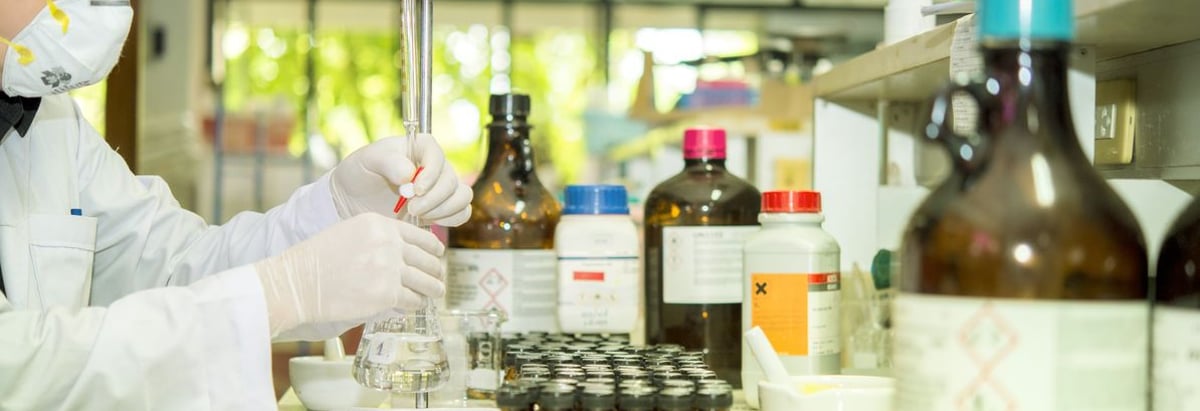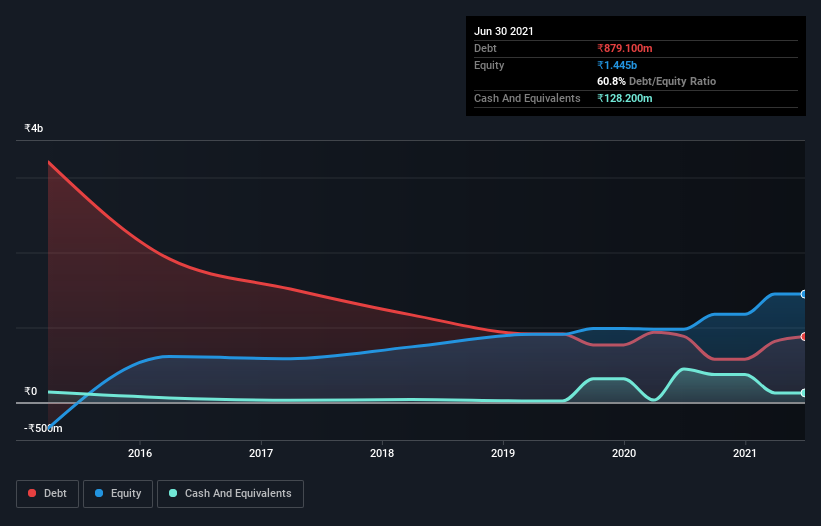Punjab Chemicals and Crop Protection (NSE:PUNJABCHEM) Has A Pretty Healthy Balance Sheet

Howard Marks put it nicely when he said that, rather than worrying about share price volatility, 'The possibility of permanent loss is the risk I worry about... and every practical investor I know worries about.' So it seems the smart money knows that debt - which is usually involved in bankruptcies - is a very important factor, when you assess how risky a company is. Importantly, Punjab Chemicals and Crop Protection Limited (NSE:PUNJABCHEM) does carry debt. But is this debt a concern to shareholders?
What Risk Does Debt Bring?
Debt assists a business until the business has trouble paying it off, either with new capital or with free cash flow. Part and parcel of capitalism is the process of 'creative destruction' where failed businesses are mercilessly liquidated by their bankers. However, a more common (but still painful) scenario is that it has to raise new equity capital at a low price, thus permanently diluting shareholders. Of course, the upside of debt is that it often represents cheap capital, especially when it replaces dilution in a company with the ability to reinvest at high rates of return. The first step when considering a company's debt levels is to consider its cash and debt together.
See our latest analysis for Punjab Chemicals and Crop Protection
What Is Punjab Chemicals and Crop Protection's Debt?
The chart below, which you can click on for greater detail, shows that Punjab Chemicals and Crop Protection had ₹879.1m in debt in March 2021; about the same as the year before. However, because it has a cash reserve of ₹128.2m, its net debt is less, at about ₹750.9m.

How Strong Is Punjab Chemicals and Crop Protection's Balance Sheet?
We can see from the most recent balance sheet that Punjab Chemicals and Crop Protection had liabilities of ₹2.13b falling due within a year, and liabilities of ₹930.6m due beyond that. On the other hand, it had cash of ₹128.2m and ₹1.10b worth of receivables due within a year. So its liabilities outweigh the sum of its cash and (near-term) receivables by ₹1.83b.
Since publicly traded Punjab Chemicals and Crop Protection shares are worth a total of ₹23.3b, it seems unlikely that this level of liabilities would be a major threat. But there are sufficient liabilities that we would certainly recommend shareholders continue to monitor the balance sheet, going forward.
We use two main ratios to inform us about debt levels relative to earnings. The first is net debt divided by earnings before interest, tax, depreciation, and amortization (EBITDA), while the second is how many times its earnings before interest and tax (EBIT) covers its interest expense (or its interest cover, for short). The advantage of this approach is that we take into account both the absolute quantum of debt (with net debt to EBITDA) and the actual interest expenses associated with that debt (with its interest cover ratio).
Punjab Chemicals and Crop Protection's net debt is only 0.68 times its EBITDA. And its EBIT covers its interest expense a whopping 14.6 times over. So you could argue it is no more threatened by its debt than an elephant is by a mouse. Even more impressive was the fact that Punjab Chemicals and Crop Protection grew its EBIT by 201% over twelve months. That boost will make it even easier to pay down debt going forward. When analysing debt levels, the balance sheet is the obvious place to start. But it is Punjab Chemicals and Crop Protection's earnings that will influence how the balance sheet holds up in the future. So if you're keen to discover more about its earnings, it might be worth checking out this graph of its long term earnings trend.
But our final consideration is also important, because a company cannot pay debt with paper profits; it needs cold hard cash. So the logical step is to look at the proportion of that EBIT that is matched by actual free cash flow. Looking at the most recent three years, Punjab Chemicals and Crop Protection recorded free cash flow of 30% of its EBIT, which is weaker than we'd expect. That's not great, when it comes to paying down debt.
Our View
The good news is that Punjab Chemicals and Crop Protection's demonstrated ability to cover its interest expense with its EBIT delights us like a fluffy puppy does a toddler. But, on a more sombre note, we are a little concerned by its conversion of EBIT to free cash flow. Zooming out, Punjab Chemicals and Crop Protection seems to use debt quite reasonably; and that gets the nod from us. After all, sensible leverage can boost returns on equity. There's no doubt that we learn most about debt from the balance sheet. However, not all investment risk resides within the balance sheet - far from it. For example, we've discovered 2 warning signs for Punjab Chemicals and Crop Protection that you should be aware of before investing here.
Of course, if you're the type of investor who prefers buying stocks without the burden of debt, then don't hesitate to discover our exclusive list of net cash growth stocks, today.
If you decide to trade Punjab Chemicals and Crop Protection, use the lowest-cost* platform that is rated #1 Overall by Barron’s, Interactive Brokers. Trade stocks, options, futures, forex, bonds and funds on 135 markets, all from a single integrated account. Promoted
New: Manage All Your Stock Portfolios in One Place
We've created the ultimate portfolio companion for stock investors, and it's free.
• Connect an unlimited number of Portfolios and see your total in one currency
• Be alerted to new Warning Signs or Risks via email or mobile
• Track the Fair Value of your stocks
This article by Simply Wall St is general in nature. We provide commentary based on historical data and analyst forecasts only using an unbiased methodology and our articles are not intended to be financial advice. It does not constitute a recommendation to buy or sell any stock, and does not take account of your objectives, or your financial situation. We aim to bring you long-term focused analysis driven by fundamental data. Note that our analysis may not factor in the latest price-sensitive company announcements or qualitative material. Simply Wall St has no position in any stocks mentioned.
*Interactive Brokers Rated Lowest Cost Broker by StockBrokers.com Annual Online Review 2020
Have feedback on this article? Concerned about the content? Get in touch with us directly. Alternatively, email editorial-team (at) simplywallst.com.
About NSEI:PUNJABCHEM
Punjab Chemicals and Crop Protection
Manufactures and sells agrochemicals, specialty chemicals, bulk drugs, and related intermediates in India, Europe, Japan, Israel, the United States, Latin America, and internationally.
Excellent balance sheet with questionable track record.
Similar Companies
Market Insights
Community Narratives



